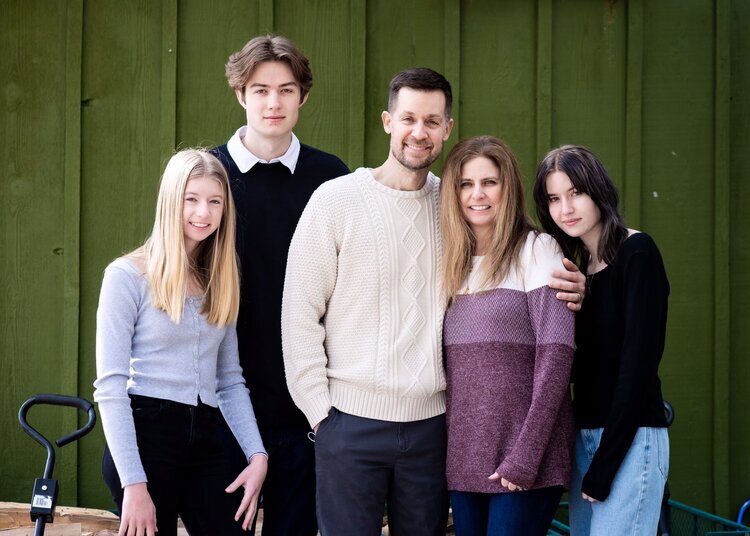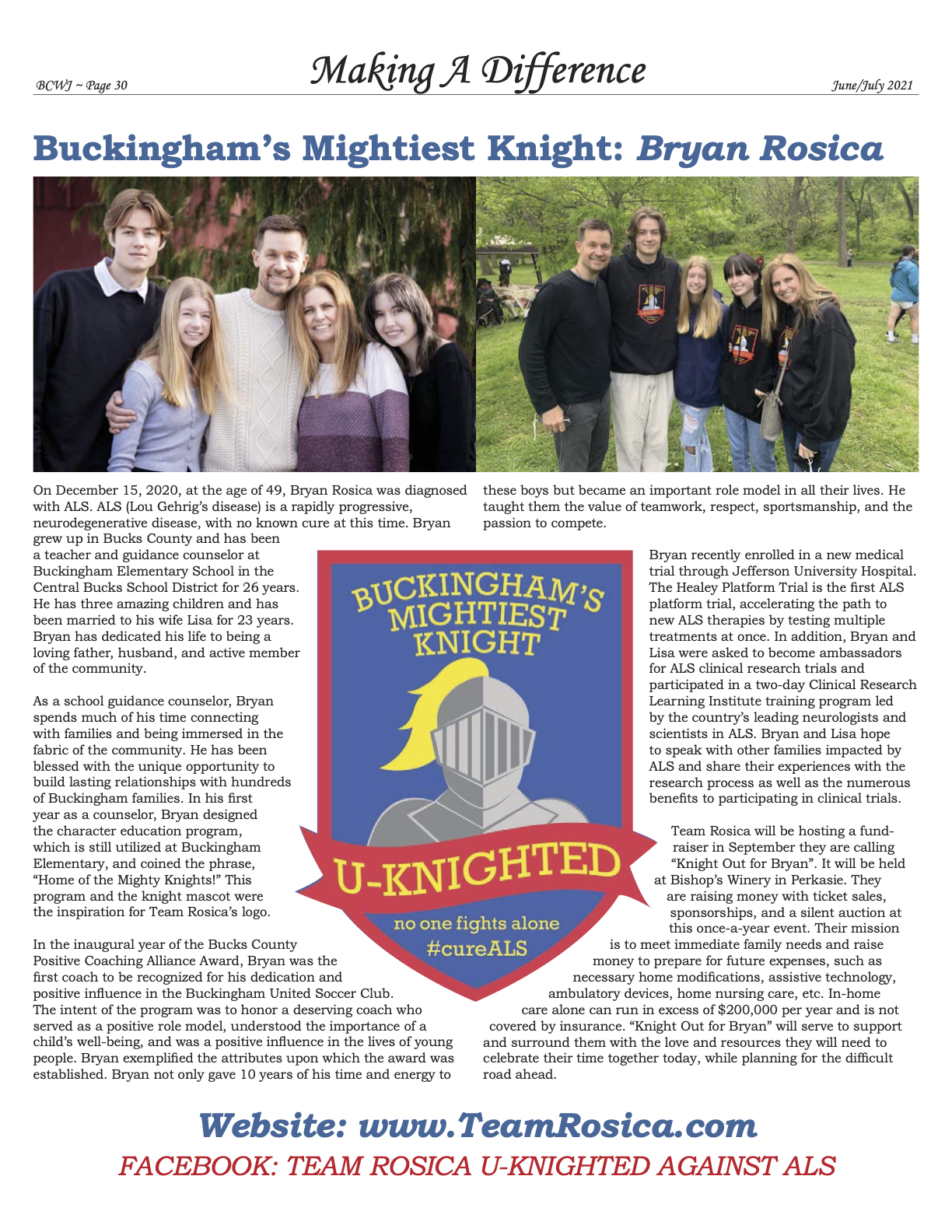









Love always wins.
Bryan Rosica grew up in Bucks County and has been a Teacher and Guidance Counselor at Buckingham Elementary School in the Central Bucks School District for 26 years. He has three amazing children and has been married to his beautiful wife Lisa for 24 years. Bryan has dedicated his life to being a loving father, husband, and active member of the community. As a school guidance counselor, Bryan spent much of his time connecting with families and being immersed in the fabric of the community.
On December 15, 2020, Bryan was diagnosed with ALS (Lou Gehrig’s disease) which is a rapidly progressive, neurodegenerative disease, with no known cure at this time. This website is designed to help tell Bryan’s story, share his progress and provide a channel to help support him and his family. Because, love always wins.
The Power of Community + ALS: Bryan Rosica’s Story
“Community” can hold many definitions for different people.
It can refer to the people who live within your neighborhood, your town, your state, your country. It can be your family, your friends, your co-workers. According to the Oxford dictionary “community” is anything that provides “a feeling of fellowship with others, as a result of sharing common attitudes, interests, and goals.”
One Pennsylvania school guidance counselor, Bryan Rosica, is a member of several communities. There’s the school system where he’s worked for more than 26 years. There’s his close-knit family including his wife, Lisa, and their three children; Brandon (21), Lauren (18) and Olivia (14).
And there’s his newest community, other patients with ALS, also known as pALS.
In August of 2020, at 48 years old, Bryan began experiencing his first symptoms. His speech became a struggle, so he went to see a neurologist at the University of Pennsylvania and by December 15th, 2020 he received his diagnosis, ALS. Even though he received a diagnosis much faster than others who spend years trying to connect their symptoms to a cause, it’s still too early to determine if he’s a slow-progressor or the estimated rate that the disease will affect his body. And with no family history of neurodegenerative diseases or factors indicating genetics, Bryan’s doctors believe he has what’s known as a ‘sporadic’ case.
While a diagnosis answers many questions, it creates a lot more.
Bryan’s family was the first to find out and the timing presented a challenge for him and his wife. It was 10 days before Christmas and the devoted parents were faced with the predicament to tell their children now and possibly ruin their holidays, or wait. Mother Nature stepped in to help them make the tough decision. A snowstorm came through Pennsylvania, giving them several quiet, uninterrupted days to spend together playing games and talking. During those moments, they decided it was the right time to start the conversation and share the life-changing news. Both Bryan and Lisa reflect on the moment they told their kids as a “sweet time”. While it was hard news, their family was together and there for one another. The news was difficult for the kids to comprehend and wrap their minds and emotions around the gravity of the situation, but thankfully they have each other to lean on.
After his family, Bryan’s extended community, the school system where he’s committed his career as an elementary teacher and guidance counselor, was the next to tell. Their response – support. Past students, coworkers, community members and parents have all come together to offer a wide array of support to the Rosica family. Around the area, people have come together for events such as Red for Rosica day, which raised $60,000 to help with expenses and home modifications. Bryan is extremely humbled and grateful for his family, friends and local community who have been so kind and caring. While his current circles have shown their support, Bryan’s diagnosis also led him to meet other pALS in the ALS community who have made him feel better prepared for the battle that lies ahead of him. For example, Bryan speaks fondly of one fellow pALS who received his ALS diagnosis more than 12 years ago and is still driving his own truck and living his life. His support, guidance and advice – as well as other pALS – has been what Bryan describes as “incredible.” Coretta Scott King famously said, “[t]he greatness of a community is most accurately measured by the compassionate actions of its members.” A sentiment which is beautifully shown in the way that Bryan Rosica’s community has shown up to provide him with a support system.
There are approximately 10,000-15,000 currently living in the United States with ALS, but there are many more affected by the disease in a variety of communities surrounding pALS.
As a community, we can work to create a world in which no one dies of ALS.
SAVE THE DATE!
The Fifth Annual "Knight Out for Bryan” Event will take place on Wednesday, October 1st at Bishop Estate Vineyard and Winery in Perkasie, PA from 5-9 p.m. The rain date will be October 8th.
Similar to last year, our “Knight out for Bryan” will be split into two separate events. Friends and family are invited to attend the in-person event and participate in a silent auction that will occur at a later date.
Click here for more information.
One Mission. Together.
Bryan has proven to be the strongest person in this journey. And because of that, his friends and community have one mission and that is to meet immediate family needs and raise money to prepare for future expenses, such as necessary home modifications, assistive technology, ambulatory devices, home nursing care, etc. In-home care alone can run in excess of $200,000 per year and is not covered by insurance.
Here is a recent photo of Bryan, Lisa, Brandon, Lauren, Olivia and their forever-loving, furry friend Daisy.

Love always wins.
With ALS diagnosis, Buckingham dad, CB school counselor is living the ultimate lesson: 'Love always wins'
Phil Gianficaro - The Intelligencer
Village Lane in Buckingham is a Rockwell painting come to life.
Well-kept homes overlook leafy trees framing the serpentine street. Neighbors leisurely walk their dogs along the roadside. Two folks chat at a curbside mailbox and smile and wave to a stranger driving by. A homeowner wearing work gloves and a baseball-type cap kneels while tending to her flower garden. Children nearby kick a soccer ball on a manicured lawn. Sunlight sidesteps the clouds and splashes upon the joyous faces of kids pedaling the summer away. In this idyllic setting, one almost expects to be treated to home-baked cookies and lemonade on every block. Life here seems perfect. Until one arrives at 5714 Village Lane.
Bryan and Lisa Rosica had it all planned out. They would continue enjoying mentoring and teaching children in the Bucks County public school system; he as a guidance counselor at Buckingham Elementary, and she as a teacher at Maureen M. Welch Elementary in Churchville. They would retire in their mid-to-late 50s, not to sunny climes, but to this very place they’ve called home for 17 years.
“We always knew we’d never leave here,” Lisa said.
They would marvel at the upstanding adults their son, Brandon, and daughters, Lauren and Olivia, will have become. They planned to host bountiful meals for family on Thanksgiving and Christmas. They had planned to bounce young grandchildren on aging knees. They would tend to the tomato garden in a backyard that appears to roll on forever. Bryan would continue a recent routine of sitting in a white rocking chair on the front porch to watch the sunset. Maybe take naps together on the hammock. Their planned-out future would be one of magnificent simplicity. Their plans were firmly in place.
What they didn’t plan on was ALS.
The college sweethearts who met at Bloomsburg University sit next to each other at a backyard table on the stone patio Bryan helped build. They hold hands but don’t hold back. Time, they’ve long accepted and discuss freely, is not on his side. Nine months ago, after multiple doctor visits and diagnostic and observational tests to learn the source of his slurred speech, their worst fears were confirmed: Bryan, at 49, was diagnosed with bulbar amyotrophic lateral sclerosis, a fatal condition that destroys the motor neurons in the corticobulbar area of the brain stem that controls muscles in the face, head and neck. Median survival time from onset to death: 20 to 48 months.
“When you get something like this, like ALS, you begin to see life through a different lens,” said Bryan, his condition making him sound as if he'd had a few too many glasses of wine at dinner. “It makes you look around and stop and smell the roses. You see what a wonderful family you have, people who love you, and friends who care about you. ALS is always on my mind, I’ll admit that. But my overwhelming feeling while dealing with this is love and thankfulness.”
Daisy, the Rosicas’ 7-year-old Labradoodle, sits on the lawn and stares up at Bryan as he recounts his story. Last August, he first noticed he was slightly slurring his speech, and that his tongue wasn’t working normally. “I had to start moving my finger around in my mouth if I ate peanut butter, to move it around,” he explained. Thus began a series of doctor visits to uncover the mystery. His primary physician, Dr. Robert J. Grabowski, who was a year ahead of Bryan at Council Rock High, examined him, but couldn’t find anything wrong due to his then-mild ALS symptoms. A neurologist believed he suffered from anxiety, but Bryan knew better. Another neurologist ruled out Parkinson’s disease and multiple sclerosis. An electromyography, or EMG, was performed to detect or rule out ALS in October.
“The results came back negative for ALS,” Bryan said. “I felt like I hit the lottery. I raised my arms and called Lisa and my cousin.”
But the source of his speech slurring had not yet been found. There were more tests and more neurologists and more crossed fingers. November brought muscle palpitations and jaw shaking. Dr. Grabowski suggested the Rosicas make an appointment with Dr. Lauren B. Elman, a nationally recognized authority in ALS diagnosis and director of the Comprehensive ALS Center at the Hospital of the University of Pennsylvania. It was 10 days before Christmas. “I just figured she’d confirm it wasn’t ALS, like the other doctors,” Bryan said. “All she did was ask me to open and close my eyes and move my tongue around. Then she told me to get dressed and that she’d be back in a few minutes. When she came back, she said, ‘Let’s talk. I’m concerned. I’m pretty positive you have ALS. It’s ALS.’
"Lisa and I hugged, broke down, and we cried. The doctor said she could write me a note to stop working. I said, ‘Why, because of COVID?’ She said, ‘No, you’re going to want to spend whatever time you have left with your family.’” The hard part would get even harder. “We’re driving home and wondering, Do we wait to tell the kids until after Christmas?” Lisa said. “It would be tough because we wear our hearts on our sleeve. But then we got that big snowstorm and were all together in the house, so we told the kids. Brandon, who’s 21 and a senior at Penn State, and Lauren, who’s 18 and was a freshman at West Chester, kind of understood. But Olivia, who’s now at C.B. East, was the most upset. She knew what this news meant because her friend’s father had ALS. It was very hard.”
Bryan was a sophomore at Bloomsburg in 1992. He and his roommates were playing volleyball outside their apartment as coeds were moving in next door. He suddenly stopped playing and rushed inside his apartment to shave a month-old beard. He knew he needed to look his best. He'd just seen the girl of his dreams. They met, but each were dating others. A few months later, they started dating. Their first dance was to Van Morrison's "Brown-Eyed Girl." "He couldn't dance," Lisa recalled. But he had everything else she was looking for.
Care for an ALS patient is expensive, with estimates at $200,000 per year. Much of it is not covered by insurance. As Bryan's condition progresses, their home will need to be retrofitted. Friends and family have rallied to the Rosicas’ cause. “Chuck Lang, one of Bryan’s best friends who he coached soccer with, took the ball and ran with this,” Lisa said. “This is the kind of support we’ve received. We are so appreciative.”
When speaking to someone living with a death sentence, a questioner reminds himself to tread respectfully. How does one seeking answers ask what it’s like knowing all those golden-years plans of family gatherings, grandchildren, and hammock naps with the love of one’s life will never be realized? Surely they know what the near future holds: the loss of speech, ability to swallow; the progressive weakness of lung function. What is living with the knowledge of death like? Hard questions to ask. The Rosicas detect my hesitation.
“Ask us anything,” Bryan said. “We’re good.” His mental outlook isn’t good. It’s great. “What I hope to do, as a school teacher, guidance counselor, father, and husband, if I have one final lesson to teach, it’s to teach my kids that love always wins,” Bryan said. “This disease can take everything from you. But it cannot take away the overwhelming feeling of love I have from my wife and children. And the love other people feel for us.
“I’m not like, Why me? This is reality, so, now what? The ‘now what?’ is how to show our kids how to do this gracefully and continue to impact people. I would hope our kids will remember their dad never gave up and that love always wins.”
Now, that's a plan. Not as perfect as they would hope, but a plan.






